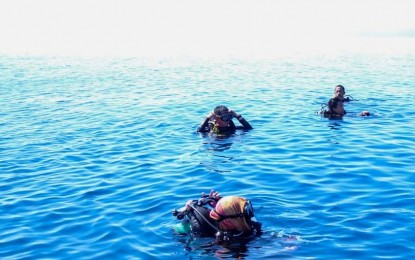
MARINE ASSESSMENT. Divers conduct an assessment in the two marine protected areas at the Sipaway Island in San Carlos City, Negros Occidental on April 18, 2024. The northern Negros city has been found to have high fish biomass and coral cover, based on the assessment of the University of the Philippines Marine Science Institute-Marine Environment and Resources Foundation in partnership with RARE Philippines' Fish Forever program. (Photo courtesy of San Carlos City LGU)
BACOLOD CITY – The City of San Carlos in Negros Occidental has been found to have high fish biomass and coral cover, based on the assessment of the University of the Philippines Marine Science Institute-Marine Environment and Resources Foundation (UPMSI-MERF) in partnership with RARE Philippines' Fish Forever program.
In a report on Friday, the city government said the underwater marine assessment was conducted in the two marine protected areas (MPAs) near Sipaway Island on April 18.
Fish biomass refers to the total number and size of fish in a given area while coral cover is the percentage of the reef surface covered in live coral.
Fish biomass is an important parameter in aquaculture for measuring fish health while reefs with high coral cover are more resilient to disturbances and provide a diverse habitat for reef species
The two MPAs, situated in the villages of Ermita and San Juan, are among the alumni project sites of the RARE Philippines Fish Forever Campaign.
During the assessment, the UPMSI-MERF team was assisted by divers from the City Environment Management Office-Coastal Resource Management Division led by MPA in-charge Oscar Molas.
"We have been monitoring these MPA sites for 10 years, with assessments conducted every two years," UPMSI-MERF member Melchor Deocades said in a statement.
He pointed out that consistent monitoring and observation indicated that San Carlos City is one of the top alumni sites, having high fish biomass and coral cover compared to other MPAs.
"We hope that the local government unit (LGU) will continue to support the programs, projects and preservation of MPAs for the benefit of fisherfolk and local communities," Deocades said.
The underwater assessment seeks to strengthen and sustain the MPA management and foster collaboration among communities and LGUs.
Other selected alumni MPA sites include Libertad, Antique; Ayungon and Bindoy in Negros Oriental; Ipil, Zamboanga Sibugay; and Tinambac, Camarines Sur.
In 2018, San Carlos City completed the implementation of the three-year Fish Forever program which began in August 2015.
This has resulted in the establishment of territorial use rights in fisheries and reserves, especially with the MPAs in Sipaway Island and many other beneficial outputs for both the marine life and the fisherfolk on the island. (PNA)
